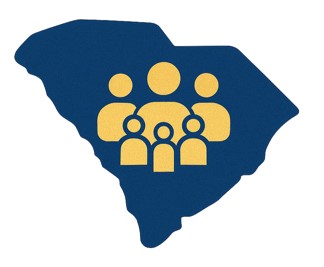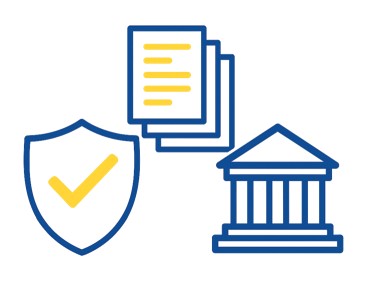 The South Carolina Commission on Higher Education was established in 1967 and serves as the coordinating board for South Carolina’s 33 public institutions of higher learning. In addition to partnering with institutions to deliver an effective statewide higher education system, the CHE acts both as an oversight entity on behalf of the General Assembly, and an advocate for the citizens of South Carolina as they seek opportunities to improve their lives, and those of their families, through higher education.
The South Carolina Commission on Higher Education was established in 1967 and serves as the coordinating board for South Carolina’s 33 public institutions of higher learning. In addition to partnering with institutions to deliver an effective statewide higher education system, the CHE acts both as an oversight entity on behalf of the General Assembly, and an advocate for the citizens of South Carolina as they seek opportunities to improve their lives, and those of their families, through higher education.
To that end, the CHE conducts more than 70 activities across four broad lines of effort:
- Academic oversight and licensing: Academic program approval, program productivity reviews, licensure of non-public institutions, intra-state reciprocity programs, educator recruitment and retention initiatives, transfer and credit mobility initiatives, and student complaint resolution.
- Scholarships and financial aid: Regulation management, disbursements and institutional auditing of state scholarship and grant programs to include LIFE, HOPE, Palmetto Fellows, Need-based Grants, National Guard College Assistance Program, College Transition Programs, the Nursing Educator Initiative, and the Higher Education Excellence Enhancement Program.
- College opportunity: Coordinate statewide college access events, financial aid literacy training, veteran benefits.
- Data, research and accountability: Collect and analyze higher education data, provide data and create reports for stakeholder use, manage national and regional data partnerships.
- Board of Commissioners
The CHE is governed by a board of 15 members appointed by the Governor. There are four statewide at-large members, with one appointed as chair; one member from each of the state’s seven Congressional Districts; three members who serve as college and university trustees representing the public sectors of higher learning, which include research institutions, four-year comprehensive teaching institutions, and technical colleges; and one non-voting ex officio member who serves as a president of an independent college representing the independent higher learning institutions.
Members representing Congressional Districts are appointed by the governor upon recommendation of a majority of the State Senators and House members comprising the District’s legislative delegation. The remaining members are recommended and appointed on the advice and consent of the Senate. Commissioners serve four-year terms, except for the institutional representatives, who serve two-year terms. All members continue to serve until a replacement is named.
The Commission has four standing committees: the Executive Committee, the Committee on Academic Affairs and Licensing, the Committee on Student Services, and the Committee on Finance and Administration. These committees each specialize in a topic important to the Commission’s statutory mission, intake related proposals and information, and make policy recommendations to the Commission for final approval. Board members serve on one or more committee(s).
For more detailed information, visit our Board of Commissioners biography page.
- President and Executive Director: L. Jeffrey Perez, Ph.D.
L. Jeffrey Perez, Ph.D., joined the CHE as President and Executive Director in July 2024. Perez has 25 years of dynamic higher education leadership in three states, including 16 years in South Carolina.
 Prior to the CHE, Perez was president and CEO of South Carolina Independent Colleges and Universities, where he oversaw advocacy, fundraising and campus support initiatives on behalf of SCICU’s 21 member institutions and 36,000 students. In his time at SCICU, Perez provided robust management of the organization, strengthening its capacity to serve the member institutions while enhancing its financial position. Throughout the pandemic he delivered strategic guidance to campus presidents, chief academic officers, and chief financial officers that bolstered their capacity to successfully address the many unprecedented challenges they faced.
Prior to the CHE, Perez was president and CEO of South Carolina Independent Colleges and Universities, where he oversaw advocacy, fundraising and campus support initiatives on behalf of SCICU’s 21 member institutions and 36,000 students. In his time at SCICU, Perez provided robust management of the organization, strengthening its capacity to serve the member institutions while enhancing its financial position. Throughout the pandemic he delivered strategic guidance to campus presidents, chief academic officers, and chief financial officers that bolstered their capacity to successfully address the many unprecedented challenges they faced.Before his leadership of SCICU he was Winthrop University’s vice president for university relations where he provided strategic communications guidance, served as principal institutional spokesperson, and represented the university at the local, state, and federal levels. He also oversaw university events and was part of the leadership team that developed the SACSCOC reaccreditation submission.
Previous to Winthrop University, Perez was vice president for external affairs at The Citadel where he developed and implemented communications and marketing plans that helped the military college achieve record enrollments and the highest annual giving in its history.
At Shawnee State University in Ohio, Perez served as executive director for Communications and Government Affairs. He rebuilt the public relations operation to more effectively promote the institution and served as secretary to the board of trustees. He also secured the first federal funding in the university’s history, which funded a motion capture lab for its gaming and simulation arts program.
Perez also held leadership positions in the State University of New York system. As director of communication services at the headquarters of the State University of New York, he served the largest college system in the country with 400,000 students across 64 campuses. He also administered the committees of SUNY’s Board of Trustees. He later served as director of public affairs for the Charter Schools Institute of the State University of New York. He was also director of research and government relations representative for the New York State School Boards Association.
Perez has chaired the National Association of Independent Colleges and Universities – State Executives and sat on NAICU’s Board of Directors. He currently serves on the South Carolina Chamber of Commerce’s Education and Workforce Development Committee and is a Furman University Riley Fellow.
Perez holds a Ph.D. in American history from the College of William and Mary. He earned a master’s degree from Binghamton University and a Bachelor of Science in Foreign Service degree from Georgetown University.
- Mission and Values
In January 2025 the CHE’s Committee on Strategic Planning and Accountability initiated the development of an agency strategic plan, beginning with a review of the current and historical agency mission and values to strengthen our alignment with both statutory responsibilities as well as broader state priorities for higher education.
The Commission took an important step in developing a strategic plan on August 7, 2025, when it unanimously approved the new mission and values below that position CHE to meet the opportunities and challenges of a changing higher education landscape. Our next steps include assigning key performance indicators to the strategic plan as well as devising its execution.
Mission
Provide strategic and collaborative leadership to improve South Carolina’s higher education system, expand opportunities for all citizens, and advance the State’s civic, cultural and economic development.
Values

Accessibility: Ensure all South Carolinians have access to high-quality postsecondary opportunities that match their educational and career goals.
 Excellence: Promote a culture of continuous improvement, innovation, civic engagement and academic rigor to deliver top-tier post-secondary educational outcomes statewide.
Excellence: Promote a culture of continuous improvement, innovation, civic engagement and academic rigor to deliver top-tier post-secondary educational outcomes statewide. Accountability: Uphold the highest standards of transparency, stewardship, and public trust in advancing the effectiveness of South Carolina’s higher education system.
Accountability: Uphold the highest standards of transparency, stewardship, and public trust in advancing the effectiveness of South Carolina’s higher education system.- Organizational Structure
The Office of the President and Executive Director
The Office of the President and Executive Director carries out the directives of the CHE board, coordinates interagency operations, and oversees the agency’s legislative affairs and public relations functions.
The Office of Academic Affairs and Licensing
The Office of Academic Affairs and Licensing provides staff support for the Committee on Academic Affairs and Licensing. It also oversees academic programs, provides reviews, evaluations, and productivity analyses; manages the licensing of nonpublic institutions and distance education programs; and administers P-20 initiatives, such as the SREB academic common market program, and regional contract program. Additional areas of responsibility include workforce development, college completion and transfer.
The South Carolina Veterans Education and Training State Approving Agency (SAA) also reports to the Office of Academic Affairs and Licensing.
The Office of Student Affairs
The office manages initiatives to prepare high school students for entrance into postsecondary education; administers veteran, teacher education, and adult education programs; and supports student financial aid by administering state-funded lottery scholarships (Palmetto Fellows, LIFE, HOPE, SC National Guard College Assistance Program), Need-based Grants, Lottery Tuition Assistance Program (LTAP), and provides residency guidance for determination of tuition and fees. The office also conducts the Program Productivity Study and orchestrates programs dedicated to higher education attainment including Educator Quality, Recruitment and Retention through the the Centers of Excellence for teacher education.
The Office of Student Affairs supports the Committee on Student Services.
The Office of Fiscal Affairs and Operations
The Office of Finance and Administration manages agency funds, budgets, procurement, human resources and oversees distribution and auditing of state-funded scholarships. The Office of Student Affairs also supports the Committee on Finance and Administration.
The Office of Information Technology and Data Analysis
The Office of Information Technology and Data supports the agency’s information technology and data infrastructure in coordination with the South Carolina Department of Administration's Division of Technology Operations. The office is also responsible for collecting and reporting data from the state’s postsecondary institutions.
Partnership Among South Carolina Academic Libraries (PASCAL)
Though separate, the CHE serves as the fiscal agent for the Partnership Among South Carolina Academic Libraries. PASCAL, a consortium of South Carolina’s academic libraries and state agency partners, fosters cooperation for shared licensing of electronic resources, universal borrowing, ILS hosting, and affordable learning.
- Historical Timeline
- Peabody Report (1946): recommend a higher education commission to “develop and maintain an adequate, efficient, and progressive system of coordinated higher education in keeping with the needs of the State.”
- Act 811 (1962): Established Advisory Commission on Higher Education (ACHE) to advise Budget and Control Board (strictly advisory, no authority)
- Act 194 (1967) creates the Commission on Higher Education (CHE) and provides it with the authority for:
- Academic program approval
- Institutional budget review and recommendations
- Recommendations on policies, programs, facilities, administration, financing
- Study requests for new or additional appropriations for operations and programs
- Report on state of higher education in SC, with recommendations as appropriate
- 1969: CHE-Institution Data Collection Agreement
- 1970: Goals for the Seventies Plan
- 1970: Participation in the Southern Regional Education Board (SREB) Education Reciprocity Programs
- 1971: Collection of five-year institutional capital improvement plans (pre-cursor of the Comprehensive Project Improvement Plan)
- 1972: Creation of the State Board for Technical and Comprehensive Education
- 1972: First Transfer and Articulation Committee and Study
- 1973: Statewide criteria for admission to associate of arts and associate of science degrees; approval of associate of applied science degrees
- 1974: Addition of SREB’s Academic Common Market
- 1974: South Carolina Student Loan Corporation chartered
- 1975: Approval of degree program approval process, incorporating new committees: CAAL and ACAP
- 1976: Statewide higher education computer network established
- 1977: Authority to license non-public degree-granting institutions
- 1979: South Carolina Master Plan for Higher Education
- 1979: First edition of Higher Education Statistical Abstract
- 1981: South Carolina Five Year Plan for Equity and Equal Opportunity in the Public Colleges and Universities
- 1984: Promotion of Advanced Placement Courses accepted at institutions for credit
- 1984: Education Improvement Act Centers of (Teaching) Excellence grant awards
- 1987: “The Cutting Edge: Higher Education’s Initiatives for Research and Academic Excellence in South Carolina” Report
- 1988: Palmetto Fellows Scholarship established
- 1989: Establishment of South Carolina Program for Recruitment and Retention of Minority Teachers (SC-PRRMT)
- 1993: Designation as state coordinating agency for the Integrated Postsecondary Education Data System (IPEDS)
- 1993: Implementation of the CHE Management Information System (CHEMIS)
- 1996: Establishment of Need-Based Grants Program (SC Children First Act 458)
- 1998: Legislative Incentives for Future Excellence (LIFE) Scholarship
- 2001: Creation of Partnership Among South Carolina Academic Libraries (PASCAL) consortium
- 2002: Lottery Tuition Assistance Program (LTAP) and HOPE scholarships (Act 496, Education Lottery)
- 2003: Establishment of the Higher Education Excellence Enhancement Program (HEEEP)
- 2007: South Carolina National Guard Tuition Assistance program
- 2007: STEM enhancements to LIFE and Palmetto Fellows Scholarships
- 2010: South Carolina Transfer and Articulation Center (SCTRAC) portal active
- 2010: SC CAN GO website and media campaign to promote college access
- 2014: College Transition Program Need-Based Grant for for students with intellectual disabilities
- 2016: Tucker Hipps Transparency Act
- 2018: Public Agenda for Higher Education
- 2021: Ascend 60x30 Public Agenda for Higher Education in South Carolina
- Regulatory Information, Policies and Procedures
